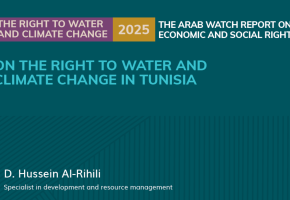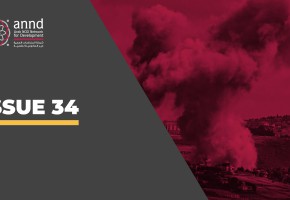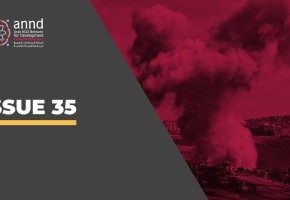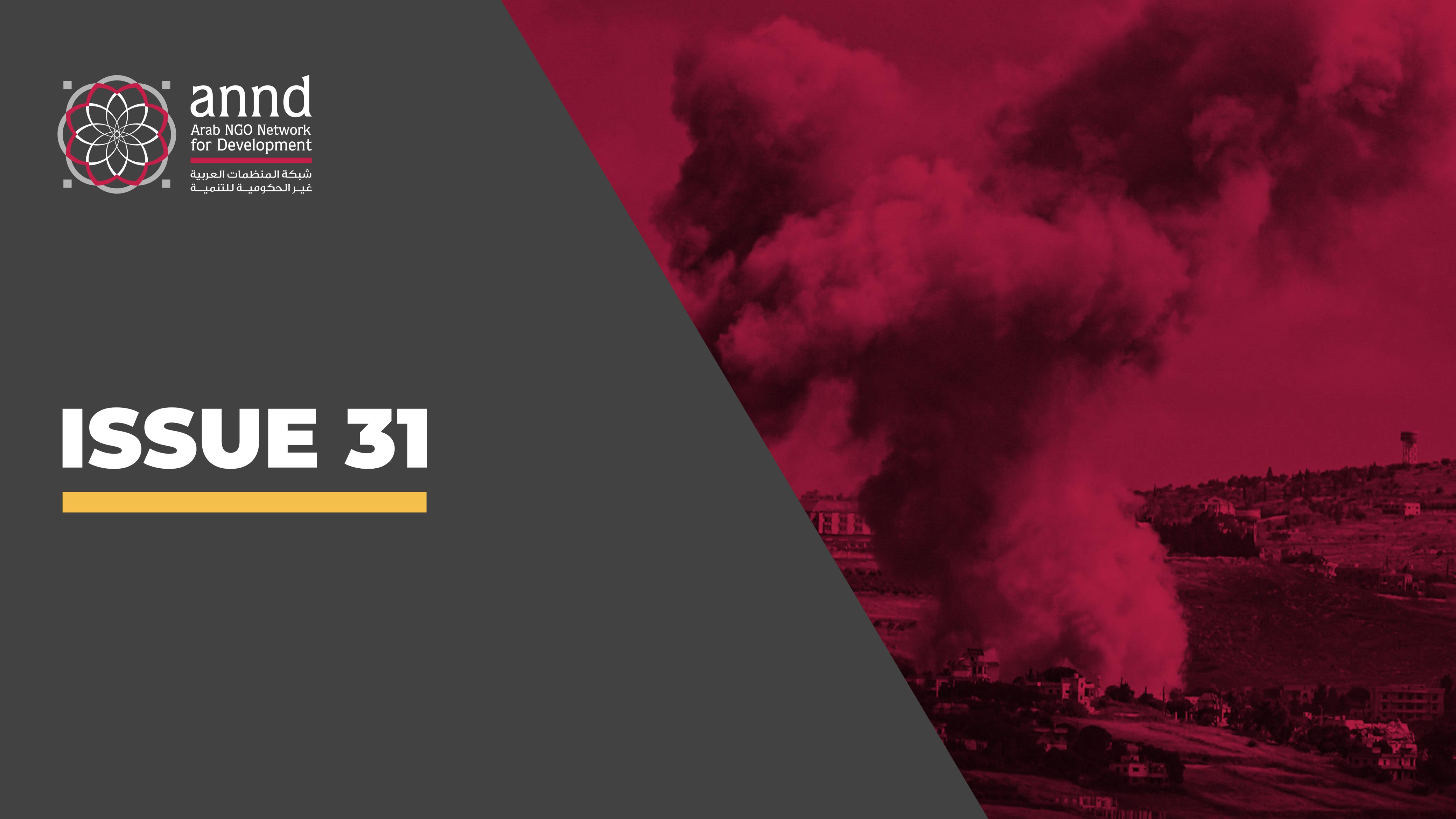
A Region on Fire
Issue 31 - October 27, 2024
Debate over the outcomes of the Israeli strike on Iran, and partial and vague initiatives accompany the escalation in Gaza and Lebanon.
Israeli Strike on Iran: Supreme Leader Calls for Caution
Following Israeli strike on Iran, media debates emerged with some exaggerating its impact and others downplaying it. In response, Iran’s Supreme Leader stepped in, urging a balanced approach and reminding that Iran reserves the right to respond appropriately. This suggests a strategy of gradual confrontations rather than decisive blows, likely leading both sides to escalate their conflict in other regions outside Iran.
These controlled responses are followed by vague negotiation efforts, including partial prisoner exchange deals in Gaza that neither end nor significantly de-escalate the war. In Lebanon, tensions are high, with international pressure on Lebanese parties to pursue serious negotiations linking a ceasefire to progress in domestic issues. There is growing concern about internal tensions due to political divides, the refugee crisis, and the risk of civilian casualties and property destruction amid Hezbollah pursuits.
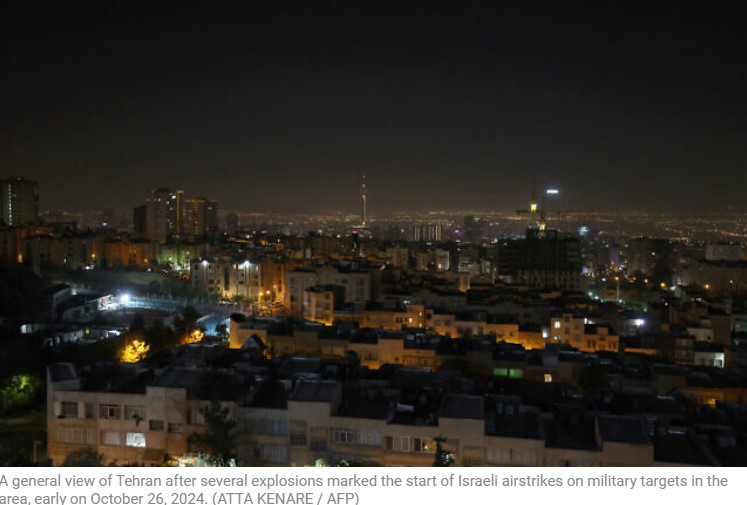
Gaza
Israel's intense air, land, and sea attacks on Gaza have killed and wounded thousands, mostly women and children. Thousands of victims remain trapped under rubble due to the ongoing bombardment and hazardous conditions. A strict blockade in northern Gaza restricts access to fuel and urgent humanitarian aid, worsening the crisis.
Since early Sunday, over 50 Palestinians, including 43 in northern Gaza, were killed in airstrikes. Three journalists died in an Israeli attack on a school sheltering displaced people in Al-Shati Camp, and the death toll from an attack on a UNRWA school rose to nine, with 20 more wounded, many critically. Gaza’s Health Director reported that only three doctors are left at Kamal Adwan Hospital due to the strikes, and more than 900 have died recently in northern Gaza, calling Israel’s actions genocidal by targeting Gaza’s healthcare system.
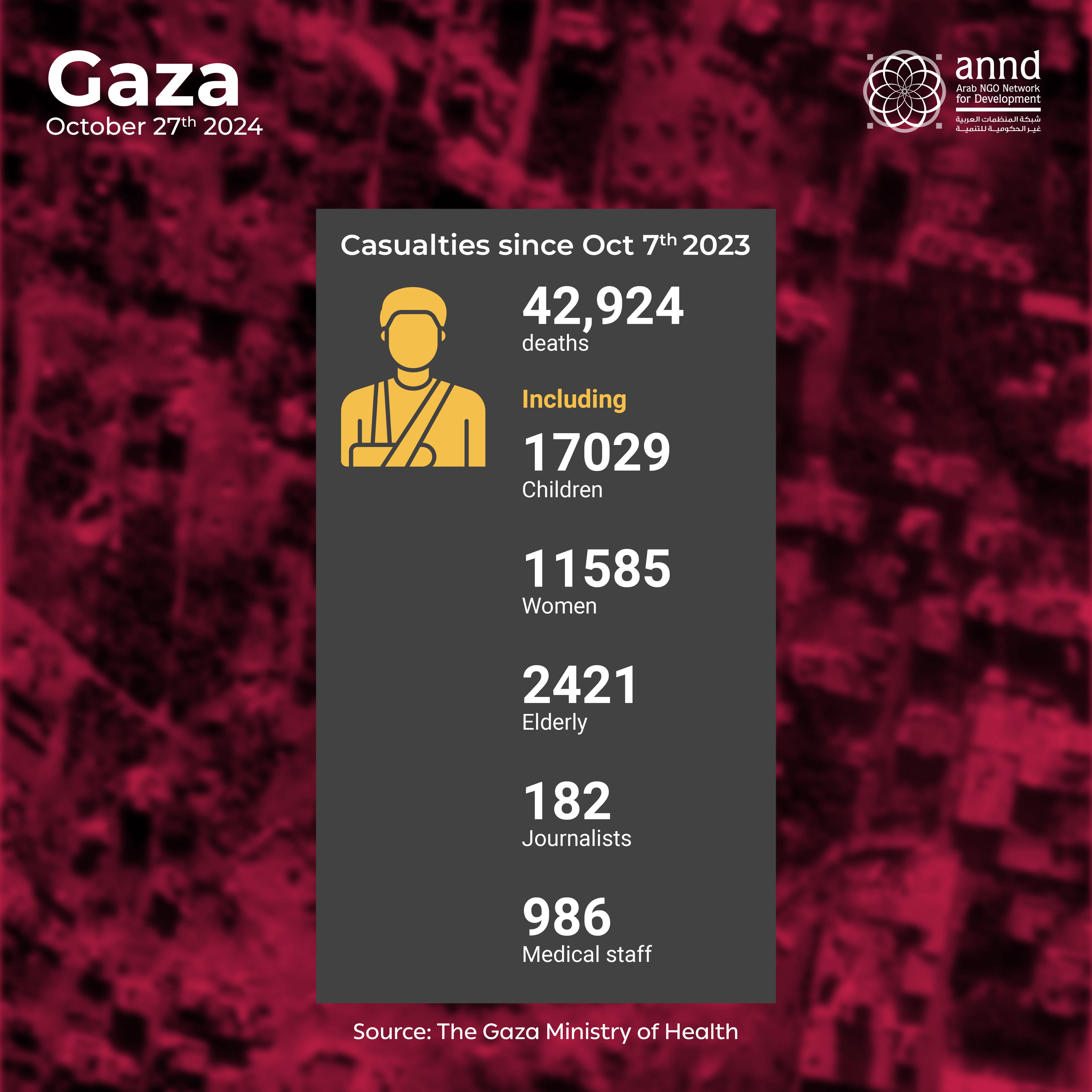
UN Secretary-General António Guterres expressed shock over the “horrific levels of death and destruction” in northern Gaza. Despite efforts to deliver essential aid like food, medicine, and shelter, Israel has largely blocked access, putting countless lives in danger.
Egyptian President Abdel Fattah El-Sisi proposed a two-day ceasefire for hostage exchange, with longer negotiations to follow. In Doha, senior officials from the U.S., Israel, and Qatar are expected to meet to discuss a short-term ceasefire involving hostage exchanges with Hamas.
In response to talk of ceasefire negotiations, Israeli Prime Minister Netanyahu warned of escalating the conflict, saying they are fighting on seven fronts. Israel has ordered northern Gaza residents to evacuate, stating that those who remain would be considered military targets and denied food and water.
While Israel denies blocking aid, the World Food Programme reports that no food entered northern Gaza for two weeks in October. Although some aid has since arrived, thousands face the risk of famine and preventable diseases, and many are unable to relocate to overcrowded and unsafe camps in southern Gaza.
Meanwhile, a Palestinian from Qalansawe carried out a ramming attack in Tel Aviv on Sunday, injuring at least 50 people, including many soldiers, and attempted a knife attack before police shot him.
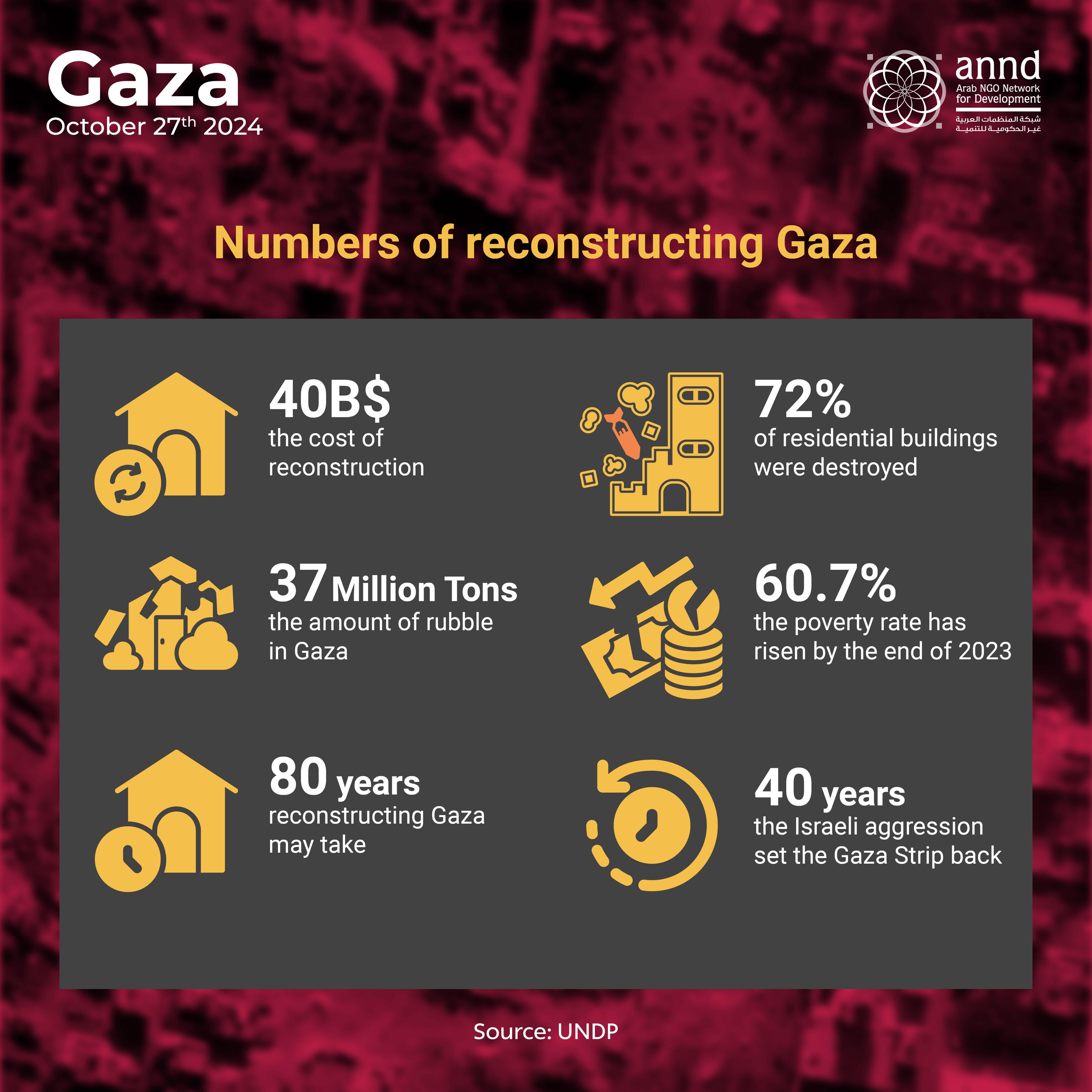
Lebanon: Battlefield Developments
The Israeli army announced it struck Hezbollah weapon production and storage sites in Beirut's southern suburbs overnight, after warning residents to evacuate certain buildings. Over the past 24 hours, it launched airstrikes on 120 targets across Lebanon, creating fire belts across large areas. Intense explosions in southern border towns were described as earthquake-like, with echoes heard along Lebanon’s coast. An Israeli airstrike on a house in Haret Saida resulted in 9 initial casualties and 25 injuries.
The Israeli army also warned residents of 14 villages in southern Lebanon to evacuate north of the Awali River.
Hezbollah reported launching a drone attack on the Yodefat military company near Acre and targeting Israeli soldiers in multiple locations in northern Israel while continuing to counter Israeli incursions on multiple fronts.
Israeli Channel 12 reported the death of 22 Israeli soldiers and officers in battles in southern Lebanon and Gaza over the past week.
Israeli Northern Command leader stated the need to eliminate Hezbollah’s threat in the north.
Lebanese Ministry of Health reported 21 deaths and 63 injuries in the last 24 hours, raising the total casualties since the start of the conflict to 2,672 dead and 12,468 injured.
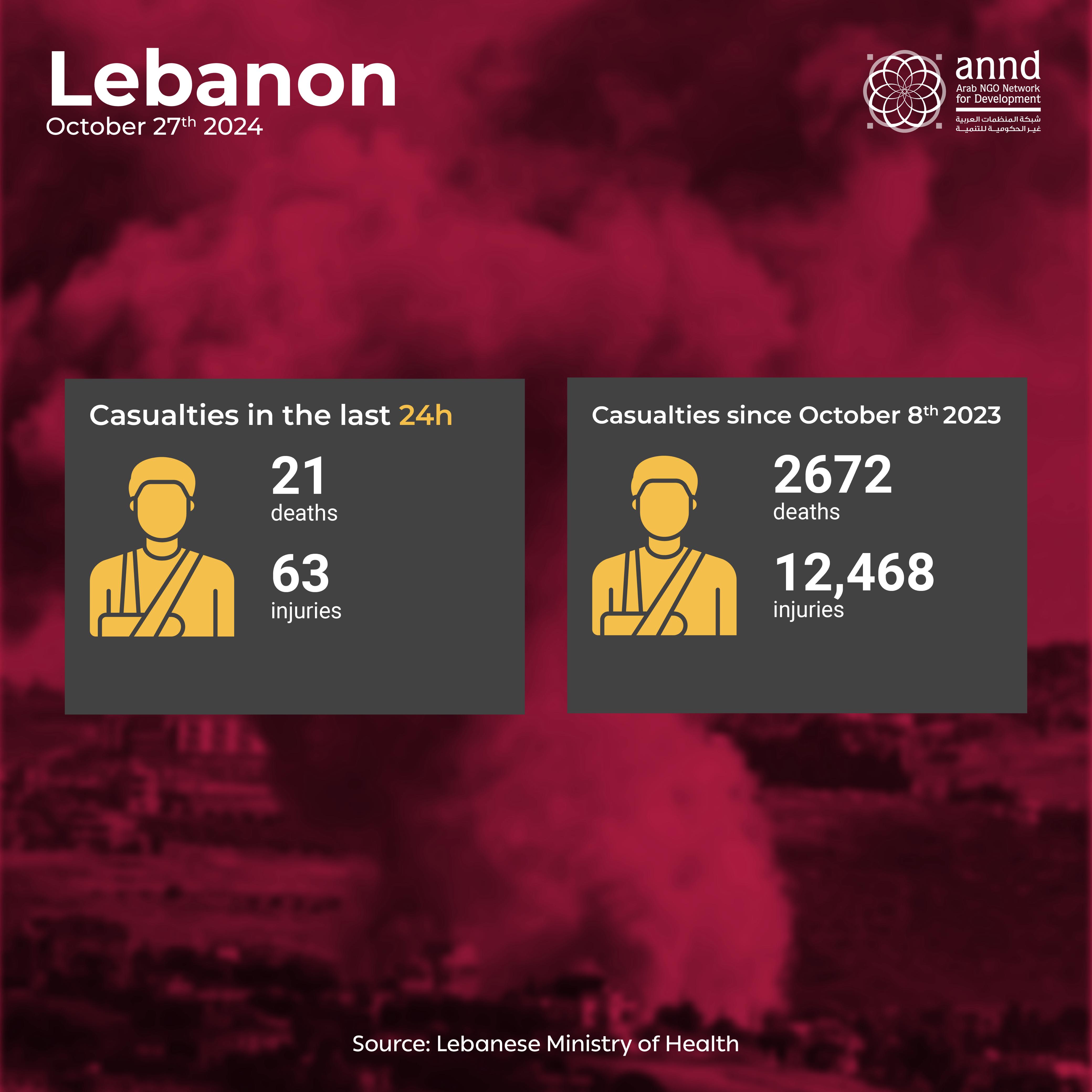
Political Positions
A new complaint was submitted to the UN Security Council documenting Israel’s attacks on Lebanon from October 15 to 24, 2024. The aim is to highlight Israel's aggression and hold the international community and the Security Council accountable for taking action to stop it.
Maronite Patriarch Cardinal Mar Bechara Boutros Al-Rahi praised the Paris conference held on October 24, which outlined a diplomatic roadmap to address the ongoing war between Israel and Hezbollah. He expressed concern that the conflict has violated international laws of war, causing harm to children, women, unarmed civilians, and humanitarian institutions.
Jordan's King Abdullah II discussed regional conditions with Lebanese Army Commander General Joseph Aoun amid ongoing Israeli attacks on Lebanon. The talks focused on the challenges facing the Lebanese military. Last week, the king also met earlier last week with Lebanon’s Prime Minister as part of an initiative to negotiate a ceasefire between Hezbollah and Israel.
Humanitarian Response
The 14th Saudi relief plane arrived at Beirut Airport as part of the Saudi air bridge. The Qatar Fund announced a $15 million grant for the Lebanese army in September 2024, and the first shipment of fuel from Qatar to support the army has arrived at Beirut Port.
Lebanon’s crisis from the Israeli war has sparked a network of grassroots and civil society aid groups. These organizations have been working since the beginning of the crisis and throughout its escalation to ease the suffering of displaced people by providing material and moral support. Local and civil organizations have mobilized volunteers in shelters across the country to provide relief, assistance, and support to displaced families in any way possible.
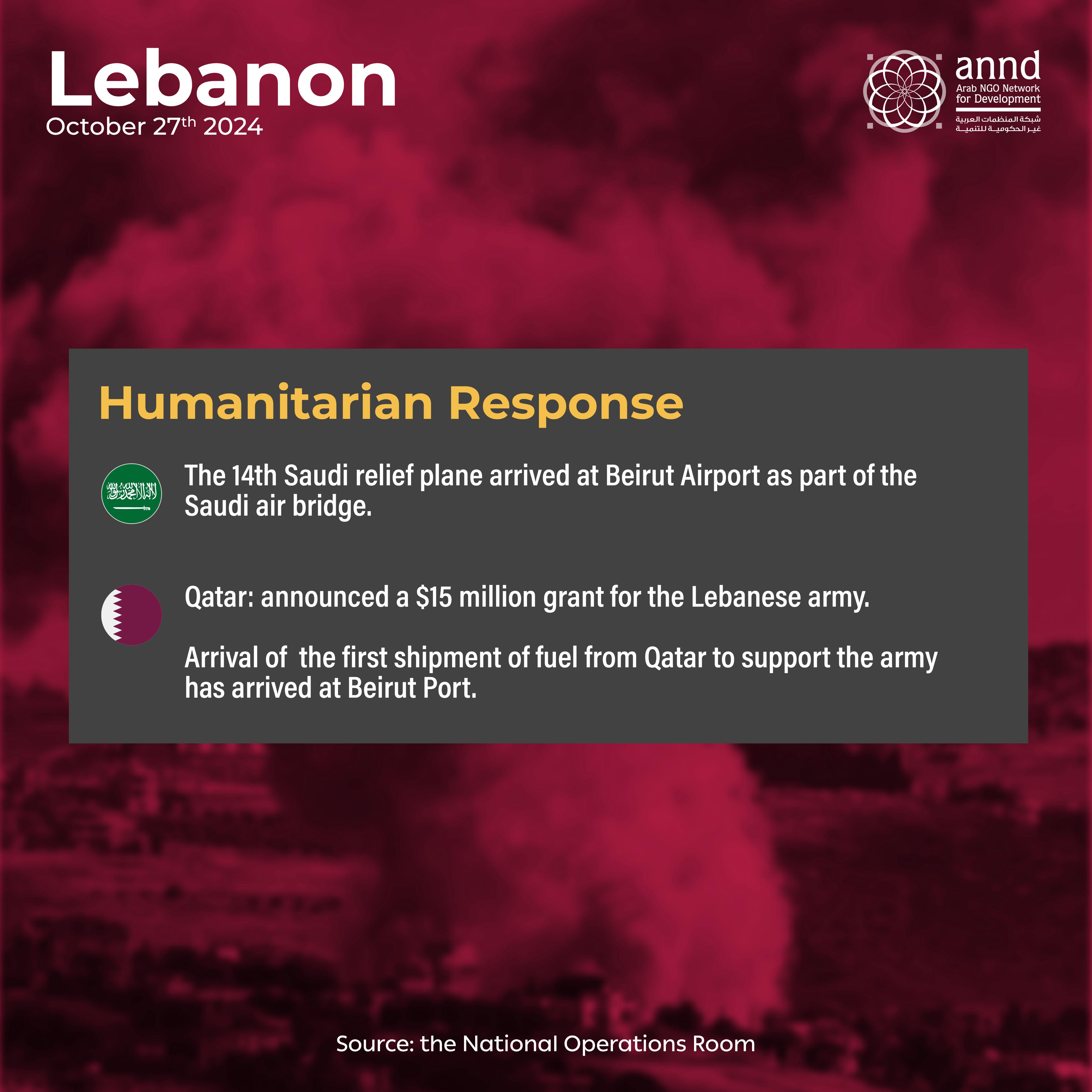
International Positions
The UN Security Council is expected to hold a meeting on Monday to discuss Israel’s attack on Iran.
Iranian Foreign Minister Abbas Araghchi emphasized that Israeli operations in the region pose a serious risk to global peace and deepen instability in West Asia.
In his letter, Araghchi urged the Security Council to convene an emergency meeting to address Israel’s blatant act of aggression and to take a decisive stance in condemning Israel’s actions.
Israeli Defense Minister Yoav Gallant said "painful concessions" are necessary to ensure the return of hostages held in Gaza, as military action alone will not achieve the war’s goals. Gallant also informed U.S. Defense Secretary Lloyd Austin about the success of Israeli strikes on Iran.
Israeli Army Radio reported that a squadron of American planes was prepared for emergency rescues if Israeli pilots encountered issues during the Iran strikes. Israeli Prime Minister Netanyahu called the strikes on Iran "precise and powerful," claiming they achieved all objectives.
Iran’s Supreme Leader Ali Khamenei acknowledged Israel’s intention to exaggerate the impact of its actions against Iran but also stated that underestimating them would be a mistake. He criticized Israel’s understanding of Iran's strength and determination, asserting that Israel misjudges Iran’s power and resilience. He condemned Israel’s military actions in Gaza and criticized the international community for enabling them, asserting that wars have rules and limits that should not be ignored.
Iranian Foreign Minister Abbas Araghchi emphasized that Iran reserves the right to respond to Israel’s strikes. Iranian President Masoud Bezhkiyan reiterated that Iran does not seek war but promised an appropriate response to Israel’s recent attacks.
According to Axios, the U.S. and seven Western nations warned Netanyahu in a letter not to let Bezalel Smotrich damage the Palestinian economy.
